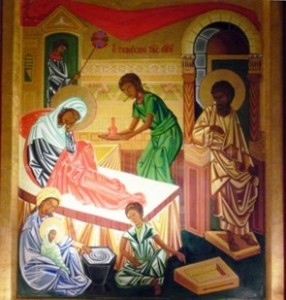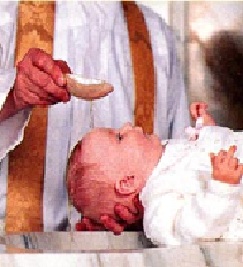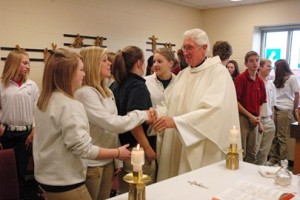If you should read the ‘Fathers of the Church’, there you will find great wisdom and a sense of joy in the disclosure of God’s plan for humanity. The ‘Fathers of the Church’ lived from the time of Jesus until St. Bernard of Clairvaulx, who died in 1113 – according to some Patristic scholars – and to explain the name, ‘Fathers of the Church’, they are the important theologians and spiritual writers, of the first period of Christianity. Many of them write, ecstatically, about the Birth of Our Lady, because the birth of that little ‘Baby Girl’ marked the first of the stages of our salvation. Mary, daughter of Joachim and Anna – as tradition has it – would be the mother of the Saviour.
 |
Birth of Our Lady.
Later, what happened, physically, and spiritually in her, when she conceived and gave birth, does not stop in the new creation, which came into being after the Resurrection. Even today, Mary is involved, whenever there is the spiritual birth of a person into the life of God, for at that moment, a person is united, intimately, with the life of her son, Jesus. Mary, in heaven, is completely united in, and with, her Risen Son, though she is distinct as a person. When a person becomes a ‘member’ of Christ – part of his mystical body – that very same Divine Life that Jesus lives, is shared, in an appropriate way, with man, woman, boy or girl, who is ‘born again’ on this earth, in Him. And, because of that intimate relationship – Jesus with Mary – in a very real sense, all Christians are ‘Children of Mary’. What a truly wonderful honour that is for all of us!
 |
Infant baptism
The ‘Fathers of the Church’ write with the same joy, and fervour, about the meaning of baptism. The presence of the Risen Christ is manifest in many different ways – not only in the life of the baptised – but also, in the person of the Bishop, in the Eucharist, in the praying Christian, in the poor person, in any brother and sister …. and so on. But, yet another ‘presence’ was mentioned in the Gospel of last Sunday: “Where two or three meet in my name, I shall be there with them”. Mary is involved in each of these different ‘presences’ of Christ in our world, because of her intimate union with Him. She sees her Son born again, and again, in people throughout this world.
There is something so very refreshing about this ‘presence’: ‘Where two or more meet in my name’ and it is simply that this ‘promise’ does not refer just to Church. If people meet in the Name of Jesus, in a family, in a work situation, in a parish, in a pub, on holiday … or wherever … then Jesus, himself, is there. That realisation, of course, is an awesome concept, for he is really present, as a person. This is what the Church, itself, should be – the place where Jesus is the ‘Director of Operations’, and as ‘Church’ is where people congregate, Jesus can be the ‘Director of Operations’ in any circumstance.
 |
People Gathered in a ‘Pub’
What is so liberating about this is that, should people agree to be united, in his name, then it will not be just the whim of one person – just his, or her, dominance – that will cause decisions to be made; rather it will be the person of Jesus, who always has the good of all at heart, and to whom all are subject. All of us are subject to the ‘Word of God’, and THE Word of God is Jesus himself – “The Word became flesh and dwelt among us”.
 |
The Sign of Peace
We may ask ourselves: “Where is Jesus present then?” In reply, I think we could say certainly at Mass. The Sign of Peace is the ‘give-away’. It doesn’t matter to whom one sits adjacent – that person is one to whom you wish peace and good-will. In other words, in Church, we are almost certainly meeting, in his name, for God makes no distinction between persons. Sadly, should a person be in Church, holding some deep resentment against another – especially if that other is also present – then this would detract from the ‘Unity’ of the occasion. Love – in God – is for everyone, friends, enemies, men, women and children – for all humankind.
The ‘whole’ meaning of Jesus’ promise, (“… where two or three come together …”) arises out of relationships between people. Relationships are the key. It occurs (v.20) in the final section of the Gospel passage (Mt, 18: 15-20), the earlier parts of which deal with a very delicate matter – that where people fall short, or sin, and when, and how, a person should correct that person. Nothing could be more delicate than the correction of another – and what counts, is that not one of God’s little ones, should be lost (Mt, 18; 14). St. Paul, in the Second Reading for Sunday, last, puts it all in a ‘nutshell’, when he says: “Avoid getting into debt except the debt of mutual love.” You do not owe anything to anyone, except to love them, and for them to love you! Paul is not referring to money, only. We could ‘owe’ the other affection, love, kind feelings, or resentment, revenge – or even utter dislike, bordering on hatred. St. Paul says the only thing we should owe anyone else is love, and perfection is mutual love! Therefore, in endeavouring to ‘correct’, if there is any sense of judgement, or superiority, then Christian, or even true human correction, is unable to be given. Correction must be linked with love. Charity travels with truth, and if there is no charity, then better not to try and correct anyone. Unfortunately, human beings do not always act in this way.
Our task, therefore, is truly to grow in love of one another. Nothing else matters. Jesus says of himself that: “I am the Way, the Truth and the Life”. In other words … “I am Peace; I am Light; I am your friend who gives his life for you.” Here, there are no ‘strings’ attached – just love! What a truly good friendship is ours, when we do not want anything from him, or her, and he, or she, wants nothing from us – just pure gift! This is a pure love – like that of the Holy Trinity. This is why, Jesus’ promise: “Where two or three meet in my name, I shall be there with them”, is not just words, but a whole new experience of life; it is something living; but the gift of this presence, of Jesus, will only come to us if we listen – truly listen to God – whoever we may be.
And this is where Mary comes in the picture, again. She was the one who was, and is, utterly open to God and what He says, to her, and to us. “Be it done to me according to your Word”; this was not just lived by Mary, at her Annunciation, but throughout the whole of her life.
 |
Given that there is need for correction, as the Gospel implies, then there must be someone who stands in the position of seeing somebody who is doing wrong. Similarly, there must also be someone who stands in need of correction – someone who has turned away from God and his love. Any one of us could, from time to time, be the one who corrects, or indeed, the one who needs correction.
Perhaps, I am the one who has acted badly – let us pre-suppose; perhaps, I am being self-centred, living in a way that makes the most of others’ misfortunes, in a way that is entirely superficial. The one who has strayed from the ‘beaten track’, too, needs to listen to God’s word, when a brother, or sister, comes along to support, and to correct out of love; he, or she, needs to be open to the other’s suggestions. Perhaps, I am the one to correct others. In this, I must listen to God’s word, so that I will deliver not my own self-centred ideas, but God’s; whichever category we fall into, we must listen to God. This ‘listening ear’ rings very true for a Benedictine monk, for the first words of St. Benedict’s Rule are, “Hearken my son to the precepts of the master”.
To summarise, if the Lord is to be among people who are gathered in his name, then not only is Mary involved, because she is the Mother of the Lord, and so welcomes her Son’s presence among his people, but she is involved, also, in that her virtues are being copied. To be united, in His Name, means that everyone then listens to God’s Word, as Mary did; it implies both humility and love – virtues that Mary had – and which we also share. If Mary in her ‘nothingness of love’, lives in us, then Jesus, himself, can be born among those who meet in his name.
May the Lord be truly among us in our Parish, in our families, in our places of work, and may we learn how to improve his ‘personal presence’ among us – for the good of the Church, the world about us, and for our good, as well.
A personal anecdote may illustrate better what I mean. It concerns myself and, therefore, will cause no embarrassment to anyone else. Once there was a fine monk, in our Parish of Leyland, called Fr. Kenneth Brennan; we became great friends, and were both curates in the Parish, under Fr. Ambrose. Fr. Kenneth died in 1986, at the age of 80+. He was a man to whom I could speak about anything, and he trusted me, as I did him – a great gift. One day, when I was in his company, he asked me if I prepared my sermons for Sunday Mass. I asked him why his question. He replied that some Parishioners had said to him that they thought I was probably a little lax in that direction. At this, I admitted, sheepishly, that I was not an expert at preparing my sermons. He looked at me with a wry smile and said; “I thought so, but because you are Jonathan, you get away with it.” His way of putting things, took the ‘sting’ out of his correction, and, from that day to this, I have always prepared a sermon, even though some people may still find me a little ‘rambling’. I think he had the ‘mantle’ of Mary in his heart that day. Were we all to have that ‘mantle’, it would do wonders for the improvement of human relationships.
In e-mailing the blog, ‘Word Press’ tends to distort the original formatting of the document. Readers may wish to visit the website www.stmarysblog.co.uk to read it in its original format.
